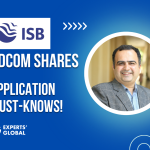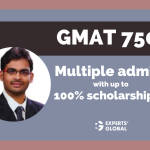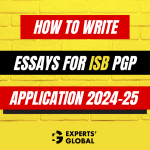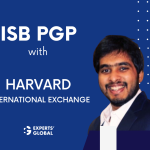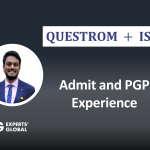Verbatim
Experts’ Global: Hi Maninder, thank you so much for your time! Could you kindly share your story in your own words?
Maninder: Back in March 2020, when India entered its first pandemic-induced lockdown, I saw a lot of my friends ramp up their GMAT preparation. Their focus excited me, and that is when I looked into pursuing my own MBA. By June 2020, on my third attempt at the GMAT, I secured my targeted score and reached out to ISB admissions consultants Experts’ Global. Their guidance and support, to me, were crucial in my PGP admit to the Indian School of Business.
Experts’ Global: In your opinion, what are the factors that made all the difference?
Maninder: To me, the GMAT is not a very tough exam, but it does require a commitment to practice. Everyone has to find a study timeline that is best suited to their comfort, but once such a timeline is decided, it needs to be followed rigorously.
Experts’ Global: Looking back, what are some mistakes you made in the process?
Maninder: My mistake was having a lack of structure in my GMAT prep. I found a question bank on the internet and began solving it for eight hour stretches daily, focusing on completing the quant section therein. Verbal was a weakness of mine, and yet it was a section I did not prioritize. Despite taking a free GMAT mock, I did not take the time to understand the concept areas that I was less sure of.
I also did not take the time to analyze my answers to the practice questions. I would only understand explanations for the questions I got wrong, and did not look to see if my thought process was correct while answering certain questions correctly.
Experts’ Global: Regarding GMAT prep, what resources did you use and what advice do you have for the candidates?
Maninder: The official material available on the GMAT website was my go-to from the start. I used the online material in order to prepare myself to take the GMAT on the internet, due to the pandemic conditions. I also used practice tests from Manhattan Prep as well as the Experts’ Global GMAT online course to make sure that I was GMAT-ready with respect to fatigue.
Experts’ Global: What was your experience with managing the application timeline like?
Maninder: I started off on a rough note. After securing my desired GMAT score, I took a month off from the process to celebrate. This is something other people should not do! When I began my school research, I started off by contacting alumni to understand the kind of story that each targeted school was looking for from a candidate. These initial conversations came in handy when crafting the essays for each of the schools I applied to!
Experts’ Global: How was your interview experience with the business schools?
Maninder: I feel like the first interview most MBA aspirants take never goes well. Even so, sometimes you can hit all the high notes in an interview and not secure an admit, which can be because your profile does not match the school’s expectations.
Do not be discouraged if some interviews seem to go poorly. Just focus on your own sincere MBA interview preparation. Try to have a few anecdotes in hand to demonstrate the growth points in your career. How you use your soft skills to sell yourself can make or break your MBA interview.
Experts’ Global: Can you please tell us more about your PGP experience?
Maninder: My PGP experience has been about opening myself to new ways of learning and always looking to network. Not only are you required to excel academically, but you also have to shore up your soft skills to succeed in post-program job interviews.
Experts’ Global: How, to you, have the pre-application phase and your PGP experience thus far contributed to your growth as a person?
Maninder: I think my journey thus far has definitely broadened my self-knowledge. The first time I tried to frame an essay talking about myself, it put many of my life experiences in a different perspective. I also learned to convey effectively what my story is, even to strangers. Overall, I have felt both professional and mental growth during the pre-application and PGP process.
Experts’ Global: What are a few common errors that you would suggest GMAT aspirants avoid?
Maninder: Try not to cram formulae and prep through rote memorization. The GMAT is an adaptive exam that modulates test difficulty based on how well you are doing on earlier questions, making your conceptual grasp very important.
Sometimes, the solutions for certain questions may not make sense at first glance. Reach out for an alternative opinion on forums such as GMAT Club. Once you feel like your GMAT studies are close to being done, be sure to complete a series of GMAT mock tests to hone in on your remaining weak areas!
Experts’ Global: What is your final message to the MBA and GMAT aspirants reading this?
Maninder: Make sure that you are prepared to put in the work to earnestly study for the GMAT, especially if you are a working professional. It can be difficult to juggle one’s GMAT prep and workload at various points, and you need to be determined to succeed.
The GMAT also allows you to select a particular time slot within which to take the exam. Try and take your GMAT mocks at the same time during the day as your final exam is to take place. In the end, your GMAT success is going to hinge on how thorough your practice has been!
Experts’ Global: Thank you, Maninder, for your invaluable thoughts and suggestions today!
Maninder: It was my pleasure!

